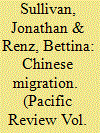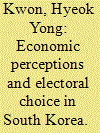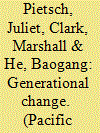|
|
|
Sort Order |
|
|
|
Items / Page
|
|
|
|
|
|
|
| Srl | Item |
| 1 |
ID:
095561


|
|
|
|
|
| Publication |
2010.
|
| Summary/Abstract |
In contrast to Sino-Russian relations at the state-level, regional cooperation between the contiguous Russian Far East and Chinese North East has been difficult to achieve, despite the existence of seemingly natural economic complementarities. This article asks why this is the case and argues that one important stumbling block, i.e. negative reactions to Chinese labour migration, has become less problematic. Situating Russian Far East/Chinese North East relations in a regionalist framework the article compares the salience and framing of major issues in regional relations in Chinese and Russian media at the national and regional levels. Contrary to earlier research, the findings suggest that economic and regional development issues, and not Chinese migration into the Russian Far East, are by far the most salient sets of issues on both sides. However, significant differences in the framing of these issues suggest that a convergence of opinion on the desirability of regional cooperation masks contradictory expectations for the direction of regional development.
|
|
|
|
|
|
|
|
|
|
|
|
|
|
|
|
| 2 |
ID:
095558


|
|
|
|
|
| Publication |
2010.
|
| Summary/Abstract |
While the notion that subjective economic perceptions as well as objective economic conditions affect electoral outcomes has long been explored in advanced democracies and new democracies, evidence of the link between the economy and elections has been rarely found in East Asian countries. As economic issues have become salient since the 1997 financial crisis, political leaders' capacity to manage the economy has become one of the most important criteria in electoral choice in East Asia. This paper examines how economic issues influenced the results of the 2007 presidential election in South Korea. By making use of the 2007 Presidential Election Panel Study, this study examines the continuity of and changes in the Korean voters' electoral behavior. This study describes the political situation in the post-1997 financial crisis period under two liberal governments in Korea and introduces the processes and characteristics of electoral campaigns in the 2007 presidential election. This paper then explores the link between the economy and vote choice, focusing on whether economic issues were salient among the electorate, whether retrospective or prospective economic voting was prevalent among Koreans, and how the voters supported Lee Myung Bak across age groups, regions, and parties in the 2007 presidential election.
|
|
|
|
|
|
|
|
|
|
|
|
|
|
|
|
| 3 |
ID:
095557


|
|
|
|
|
| Publication |
2010.
|
| Summary/Abstract |
The Australian Prime Minister Kevin Rudd has recently announced plans to develop greater regional integration and cooperation in the Asia-Pacific region. Historically, Australian opinion, however, has expressed some anxiety about forging closer economic, political and security ties with Asia. Using trend data from the Australian Election Study and the Lowy Institute Poll, this article examines changes in Australian public opinion on closer engagement with Asia and whether the Australian public is likely to support the Rudd government's push towards developing deeper regional diplomacy. The article finds a shift in opinion since the 1990s with a younger generation of voters who are moderately supportive of Australia's engagement with Asia.
|
|
|
|
|
|
|
|
|
|
|
|
|
|
|
|
| 4 |
ID:
095560


|
|
|
|
|
| Publication |
2010.
|
| Summary/Abstract |
The notion of the resource curse suggests that countries with large caches of natural resources often perform worse in terms of economic growth, social development, and good governance than other countries with fewer resources. The theory posits that countries depending on oil or other extractive industries for their livelihood are among the most economically troubled, socially unstable, authoritarian, and conflict-ridden in the world. This article explores whether the resource curse is occurring in relation to oil and gas production in Southeast Asia, where investments in oil and gas infrastructure are expected to increase significantly. The article begins by conceptualizing the resource curse before explaining the factors believed to cause it. It then proposes metrics that can be used to identify the presence of the resource curse before testing these metrics on the five Southeast Asian countries with the largest rates of oil and gas production and reserves - Brunei, Indonesia, Malaysia, Myanmar, and Thailand - from 1987 to 2007. The article compares the performance of these Southeast Asian countries with the five largest producers in the Organization of Petroleum Exporting Countries as well as Brazil, China, India, the Russian Federation, and South Africa. The article concludes that the resource curse is not occurring in any of these countries, and that the theory may be too simplistic and deterministic to fully explain why some countries appear to be 'cursed' with resources while others are 'blessed'.
|
|
|
|
|
|
|
|
|
|
|
|
|
|
|
|
| 5 |
ID:
095556


|
|
|
|
|
| Publication |
2010.
|
| Summary/Abstract |
The US strategic ambiguity versus clarity has been a centerpiece in maintaining cross-strait stability since the 1995-96 Taiwan Strait crisis. Dialogues and debates abound regarding the relative effectiveness of discrete US policy choices. The current thaw in cross-strait relations does not forestall decisively the resurgence in the long run of the cross-strait tensions during 2000-08, rendering the strategic ambiguity/clarity still a relevant issue. This article argues that the discussions on the issue are seriously plagued by the lack of a sufficiently rigorous and commonly shared conceptualization of strategic ambiguity/clarity, and an internal logical contradiction or an inadequate practical utility as a tool to aid policy-making. To address these problems, this article seeks to clarify and elaborate on the conceptual foundation of strategic ambiguity/clarity by differentiating between two distinct analytic levels thereof, and proposing a conceptual framework for a fuller understanding of the US policy along various dimensions. It also reappraises some major issues or problems found in the existing discussions and US practice, and suggests possible solutions.
|
|
|
|
|
|
|
|
|
|
|
|
|
|
|
|
| 6 |
ID:
095559


|
|
|
|
|
| Publication |
2010.
|
| Summary/Abstract |
Interest among academics towards Hong Kong's global status has gradually waned since 1997. However, identifying Hong Kong's position on the international platform is essential if the Special Administrative Region's competitiveness is to be distinguished from that of regional rivals. The positioning challenge not only results from the sovereignty retrocession, but also from the rapid pace of globalization and the intensified competition from major cities in the Greater China Region. Instead of focusing on the much-researched topic of the direct competition between Hong Kong and Shanghai or Singapore, an exploration of Hong Kong's hitherto little-researched re-branding experience not only throws light on Hong Kong Special Administrative Region's policy orientation, but is also valuable in understanding how other cities in the region conducted similar exercises. This article reviews the overall evolution of the 'Asia's World City' (AWC) discourse as promoted by the Hong Kong Special Administrative Region from 1997 to 2007. It starts by reviewing the international identity of post-colonial Hong Kong as background to the discourse, in order to reconstruct various theoretical assumptions that led to the re-branding exercise. The second section examines the purpose and evolution of the AWC campaign, and identifies the problems within the discourse. The concluding section focuses on the unrealized theoretical assumptions and other administrative and ideological constraints that the HKSARG faced in the exercise as a means to explaining the overall limited achievements of the campaign and proposes possible ways to remedy the shortcomings.
|
|
|
|
|
|
|
|
|
|
|
|
|
|
|
|
|
|
|
|
|